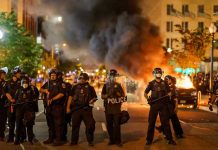
One of the world’s longest-serving female leaders has just been sentenced to death by a court she herself created—setting off a political earthquake in Bangladesh and ripples of uncertainty across South Asia.
Story Snapshot
- Sheikh Hasina, exiled former prime minister, sentenced to death for ordering a deadly crackdown on mass protests in 2024
- The International Crimes Tribunal—established by Hasina—delivered the verdict in absentia, sparking fierce debate over justice and political retribution
- The crackdown left more than 1,400 dead and thousands wounded, making it the bloodiest event since Bangladesh’s independence
- With Hasina in exile and her party banned, Bangladesh faces a volatile mix of political uncertainty, public anger, and regional diplomatic tensions
Historic Fall for a Political Titan
Sheikh Hasina, who once stood as the unchallenged leader of Bangladesh, now finds herself at the center of a firestorm she never imagined. After decades at the helm—her tenure spanning 1996–2001 and 2009–2024—her grip on power finally slipped following a student-led uprising over civil service job quotas. What began as a protest against perceived favoritism exploded into a nationwide rebellion, with the government’s response leaving a staggering death toll and an even deeper scar on the national psyche.
Hasina’s abrupt flight to India in August 2024 signaled the end of an era, but her political shadow lingers. Tried in absentia by the International Crimes Tribunal—a body she herself had launched to prosecute war crimes from 1971—she was handed the ultimate sentence. Her supporters call it vendetta. Her detractors call it overdue justice. The world watches, wondering what this means for the future of leadership and accountability in Bangladesh.
The Crackdown That Changed Everything
The roots of the 2024 disaster lie in a simple grievance: a quota system that awarded 30% of coveted civil service jobs to descendants of war veterans. For Bangladesh’s youth, this symbolized entrenched elitism and a system stacked in favor of Hasina’s ruling Awami League. When students took to the streets in June, they unleashed years of pent-up frustration over economic stagnation and political suppression. Within weeks, the protest grew into a mass uprising—the largest since independence.
Security forces, under what the tribunal found to be Hasina’s direct orders, responded with overwhelming force between July and August 2024. The result: more than 1,400 dead, thousands more injured, and a society stunned by government brutality. The violence, unprecedented since the nation’s founding, shattered the myth of stability that Hasina had so carefully cultivated during her rule. It also set the stage for her spectacular reversal of fortune: from revered leader to convicted criminal.
Aftermath: Exile, Division, and Diplomatic Dilemmas
Hasina’s escape to India placed New Delhi in an unenviable position. As Bangladesh formally requested her extradition, Indian officials hesitated, wary of regional instability and the optics of handing over a former prime minister to face execution. The diplomatic dance has left Hasina in limbo and Bangladesh’s interim government grappling with legitimacy. Meanwhile, the Awami League, the very party Hasina once led, is banned and its members threaten to disrupt the 2026 elections, raising fears of renewed unrest.
The International Crimes Tribunal verdict has polarized Bangladeshi society. Human rights groups question the fairness of a process that many believe is tainted by politics. Critics argue the verdict is symbolic, unlikely to be enforced given India’s reluctance and international opposition to the death penalty. Yet for the families of victims and a restless youth population, the trial represents a rare assertion of accountability—however flawed the process may be. The prospect of further protests, election boycotts, and diplomatic strain looms over the country’s immediate future.
Legacy, Lessons, and the Road Ahead
Hasina’s conviction is more than a personal downfall—it is a stark warning to those who wield state power without restraint. Bangladesh now stands at a crossroads. Will the verdict set a precedent for holding leaders accountable, or will it deepen divisions and perpetuate cycles of retribution? The nation’s economic prospects hang in the balance, with investors wary of instability and social trauma lingering from last year’s carnage.
As international observers scrutinize Bangladesh’s democratic credentials and human rights record, the world waits to see whether this moment brings genuine reform or merely shifts the faces at the top. For now, Sheikh Hasina remains in exile, her legacy shadowed by blood—a cautionary tale for leaders everywhere who mistake longevity for invincibility.
Sources:
The Week: Sheikh Hasina—Why Ousted Bangladesh PM Has Been Sentenced to Death













